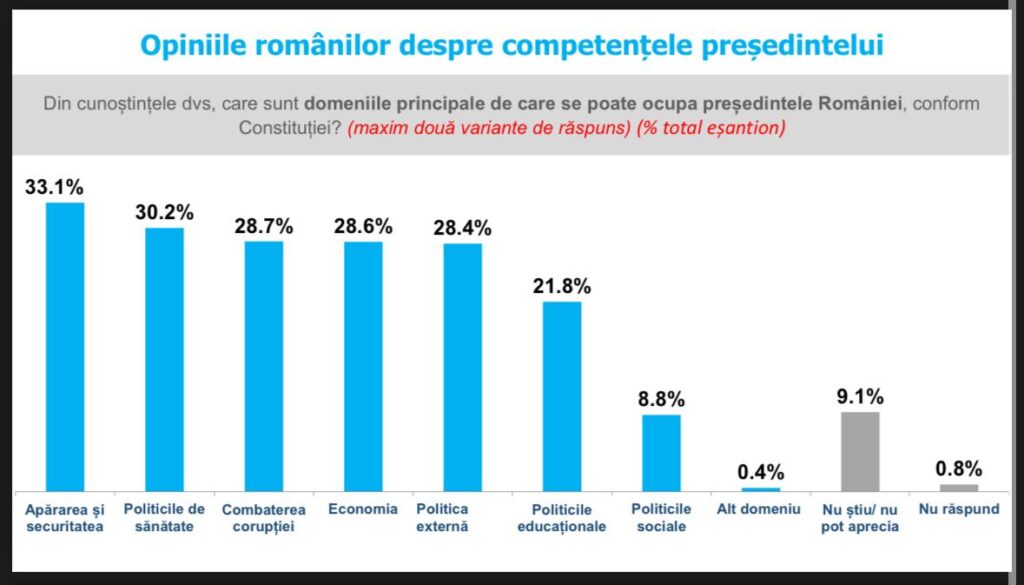The first condition for voting intelligently and efficiently, in order to have a real chance of being satisfied with the outcome of the choice made, is a correct calibration of expectations, in simpler terms: to know exactly what you are voting for, what are the duties of the position for which you are choosing the holder, and how suitable each candidate is for these duties.
If you vote for the president of the tenants’ association hoping that he will pave the street or reduce inflation, you have no chance of being satisfied with the election outcome. If you vote for the mayor to have light in the stairwell, you will remain in the dark. If you choose the president of Romania to have a higher salary, you will be deeply disappointed.
Tomorrow we are called to vote for the president of Romania, and the first condition for a good choice is the same: to understand exactly what the president's duties are, what he can do according to the Constitution and current laws.
A recent INSCOP poll measured what Romanians think about the president's duties. In other words, for what reasons they choose him. The results are worrying.

As long as almost a third of Romanians believe that the president has responsibilities regarding health policies, more than a quarter in the economy, and over a fifth in education, the vote in the presidential elections in Romania is deeply flawed, starting with the criteria for choosing.
What are the real powers of the President of Romania?
The formulation in Article 80 of the Constitution is generic: "1) The President of Romania represents the Romanian state and is the guarantor of national independence, unity, and territorial integrity of the country.
(2) The President of Romania ensures compliance with the Constitution and the proper functioning of public authorities. For this purpose, the President mediates between the powers of the state, as well as between the state and society."
Beyond that:
- The President presides over the Supreme Council for National Defense, but decisions of this body are consensual
- Appoints the Prime Minister, but Parliament can reject the appointment. And once invested in office, the Prime Minister cannot be dismissed by the President.
- The President can dissolve Parliament, but only if it rejects two successive proposals for Prime Minister within 60 days, a continuity that Parliament can interrupt at any time by appointing a Prime Minister who is then ousted by a motion or sabotaged at every turn.
- The President can be suspended by Parliament for one month, until the impeachment referendum, during which an interim president assumes the vast majority of duties, including the most important ones.
- The President proposes the heads of the Foreign Intelligence Service and the External Intelligence Service, but they must be voted on by Parliament. Appoints the deputy chief and deputies of the SRI director, but at his proposal. Appoints the director of the Protection and Guard Service, but based on the consensual proposal of the Supreme Council for National Defense.
- The President can call a referendum, but, as we have seen, the obligation of its effects is limited to the fact that legislation cannot be enacted against the validated results.
- The President appoints ministers by decree, but only at the proposal of the Prime Minister and, according to the Constitutional Court, can reject, with justification, a single proposal. Dismisses ministers, without being able, also according to the Constitutional Court, to refuse to sign the dismissal decree if the Prime Minister's request meets the conditions of legality.
- The President appoints chief prosecutors, but at the proposal of the Minister of Justice. And was forced by the Constitutional Court to sign the dismissal of a chief DNA prosecutor requested by the Minister of Justice.
- The President's exclusive and practically unrestricted powers relate to foreign policy, the appointment of ambassadors, and the awarding of decorations.
In short, in economics, education, health, the president cannot intervene directly, he has no leverage. His influence depends on the control he has over the Prime Minister and at least one of the parties in government.
This control, however, to be effective, can only be unconstitutional, as the president must distance himself from parties to become equally representative of all. In fact, even the choice of the Prime Minister is made not based on distilled democratic and constitutional criteria, but on the extent to which this choice ensures his power over the governance process.
So if we elect the president for what he cannot do and in order to deliver, he must violate the Constitution, it is also hypocrisy or self-deception. Our mentality, where the connection with the ruler was essential, is probably to blame.
Would a constitutional amendment be necessary? It is increasingly evident that yes. But there is a long way to go before that, and not even a serious discussion on this subject has started.
But even to proceed on this path, not just for voting efficiently, we should understand correctly what the president's duties are, what we should expect from him, and how to assess the candidate's suitability for the position. And once these things are understood, it will become clear in which direction a constitutional amendment would be necessary.
The President of Romania does not have real executive powers, especially in everyday life, he has responsibilities in the field of national defense system, foreign policy, and some high-level appointments, but not exclusive ones, either he proposes to parliament for approval, or he receives the proposal, as in the case of chief prosecutors and cannot refuse indefinitely. He promulgates laws, but after the Constitutional Court's notification and a request for reconsideration, he cannot refuse to sign.
When a candidate in the presidential elections promises you cheap houses, lower taxes, industrialization, jobs and salaries, hospitals and schools, they are lying to you, simply because all these are not within their powers. And if you vote for them for these reasons, you are letting yourself be deceived.

